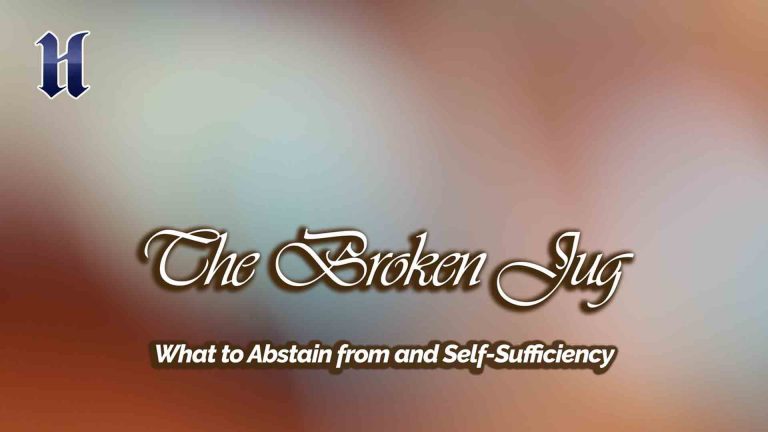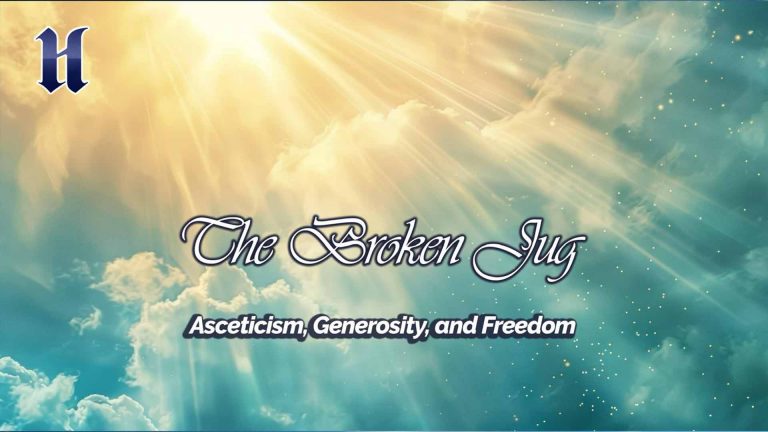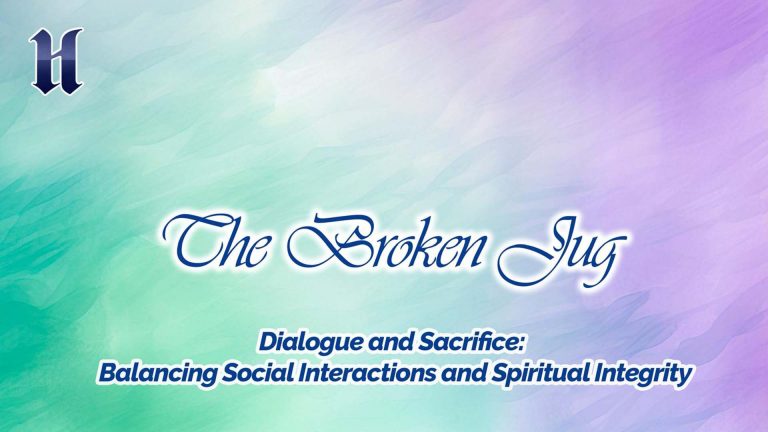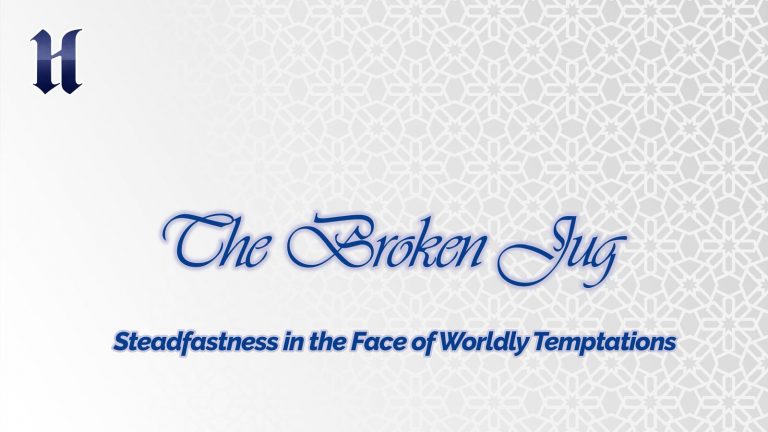Question: Those who work at the establishments based on the philosophy of devotedly serving humanity, sometimes begin to develop expectations of a better payment and life standards, owing to factors like long working hours or having produced high quality work. Could you share with us your considerations on this issue?
Answer: Let me first state one thing—that not all people will be on the same level of devotedness, as it is the case with other moral virtues. Even if a certain spiritual guide has an ability to make surprising impact on the hardest hearts, it is not possible for him to bring all of the people he guides to the same level of spiritual progress. As the guide is expected to give the message perfectly, those who are to receive the message need to be capable of receiving the message with their potentials and abilities. Let us say that you run to help a certain man with a water tanker, but he only has a bucket in hand. Even though you empty the contents of the entire tanker, the water will pour out once the bucket is filled.
When the Age of Happiness is viewed from this perspective, it becomes apparent that there were serious “level differences,” even between the Companions of the noble Prophet, the most influential guide, who consisted of, and emanated, blessed light in every way. It is not possible for ordinary people like us to categorize those radiant figures. Despite this, it is definite that few Companions shared the same level with people like Abu Bakr and Umar. We can say that every one of the Companions of the Prophet benefited from God’s Beloved one, who was the focal point of Divine manifestations, in-as-much as their personal aptitudes and capacities allowed.
Such a difference of level is also true for the devoted souls in our time. For example, some of them can live of barely enough food for sustenance—sometimes they even starve; but they still do not ask anything from others, and keep their dignity.
However, some of them cannot forebear such sacrifice; they might adopt attitudes and expectations to violate the principle of dignified contentment. Similarly, as some people lead their lives by keeping up a serious consciousness of death, the dominant feeling in others might be a longing for worldly goals and delusion of permanence. I heard a few days ago that an old person—who has one foot in the grave as they say—visited a doctor and asked: “I heard some rumors, is there anything real as the potion of immortality?” In my opinion, delusion of immortality for a person of that age is nothing but seeking disgrace. It is a reality that a wish for an everlasting life, together with the feeling of cherishing worldly goals and endless desires, is inherent in human nature. However, it should not be forgotten that this feeling in human nature is supposed to be directed to the eternal afterlife.
As is the case with devotedness and other qualities, despite spending time with the devoted ones, a person may not quite share the same spirit. Some people always have their eye on higher worldly benefits. For this reason, they do not feel content with the payment, title, and status they have; they expect to have these increased at certain intervals. And when they get what they desire, they set about seeking even more. Their lack of thankful contentment causes them to complain all the time. For this reason, it needs to be accepted as a reality that such people can be found even within the sphere of the devoted ones.
Responsibilities Must Be Entrusted to Eligible Ones
When needs to be done about dealing with this reality? First of all, people in certain positions should discern well the personality and natures of the people they are responsible for; they should consult with as many people as possible. This shared information should serve as a criterion that can assess the levels of individuals who act with commonsense and ascend to higher steps in life. If this can be done, people with worldly ambitions will not be able ascend to certain positions and breach the principle of dignified contentment. In fact, sometimes you need to employ someone in an important position, and cannot find anybody that suits your criteria. The only candidates for the job might possess some weaknesses, such as greed and envy. Then, even though they do not meet your standards of virtue, you may choose the lesser of two evils, and will temporarily entrust that important responsibility to such a person, rather than leaving things undone. But when you find the eligible one to carry out the job, you shift the former to a more suitable position and let the deserving one assume control. Entrusting a duty to someone else while there is an eligible one will be a betrayal to that duty, or a breach of trust.
When somebody asked the noble Prophet about the Last Day, he told him that breach of trust would herald the coming of the Last Day. And when the man asked about this breach of trust, the beloved Prophet told him to expect the time of Last Day when responsibility is given to the ineligible.1 Accordingly, if you entrust some responsibilities to one who is not eligible for them, then it is a kind of “Last Day” for that particular responsibility. If this state becomes general and permanent, then the Last Day can come. It appears that when the appointed hour for the world comes, betraying the trust will have become a grave, worldwide issue.
Having More Abundant Means and Real Economy
Another thing that needs to be done about people who never feel satisfied but always have their eye on more worldly benefits is to remind them that self-sacrifice and sufficing with the available means is not a principle only to be followed during hard times; it is necessary to help them attain a character of living with economy and dignified contentment in all conditions.
Gaining access to more abundant means should not change our general discipline. As the noble Prophet stated, even a person making ablutions near a river should avoid wasting water. Accordingly, as it is a waste for such a person to dip one arm in water and wait for 2–3 minutes; washing the limbs 4–5 times instead of 3 is wastefulness as well. A religious teaching that places so much emphasis on frugality also requires the same sensitivity in other matters. That is, if a person near a sea needs to act frugally, then a person in charge of a wealth like the sea should also live frugally, avoid wastefulness, and never change his or her lifestyle. For example, they should keep their habit of eating within the limits brought by Islam and never waste anything. As it is known, Bediüzzaman pointed out the fact that unnecessary eating triggers a false appetite. Then instead of sufficing with a single kind of food, having a diverse spread and tasting various dishes will trigger such a false appetite, which is harmful to health. Therefore, no matter how much wealth God Almighty grants, individuals should eat the necessary amount and avoid excess.
Some of the Companions led very austere lives in spite of being very wealthy. For example, Uthman ibn Affan had abundant means to donate three hundred camels and also to provide ten thousand soldiers with equipment. In spite of that, he never changed his life standards. He mostly spent his life on the sands of the Prophet’s Mosque. He would make a little heap of sand and use it as his pillow. He ate the same meal with others. Ali ibn Abi Talib, who also lead his life in the same simplicity, had only one dress to wear. He wore it both in summer and winter. As a matter of fact, he was a caliph who ruled an affluent state in a very extensive region. He and other great personalities followed the way of the blessed Prophet and continued to lead a simple life. These are very important examples for us. If we are to change our lives after gaining access to better means, then—may God forbid—it means that we have stepped into a vicious circle of unending negative change.
A Bohemian Life Has No Limit
You need to be so steadfast on this issue, so that even if God Almighty makes money shower down from the sky and form a heap before you, you should still say, “no matter how abundantly you come, you cannot find any way into my heart. I know where to use you.” Some saintly figures spent all of the goods God bestowed them without leaving anything for the morrow. A report included in the collection of Imam Bukhari teaches us the attitude to be adopted in the face of worldly means. Accordingly, while the Messenger of God, peace and blessings be upon him, was about to lead a Prayer at his mosque, he suddenly stopped and rushed to his room. After that, he returned and led the Prayer. When the Prayer was over, he turned to the puzzled congregation and explained that at the moment he was about to start the Prayer, it occurred to him that somebody had given him a present. Since this worldly property could occupy his mind during the Prayer, he told his wife Aisha to give it to someone else so that he could free his heart and stand in God’s presence thus. This perfect lifestyle of God’s Messenger, together with his blessed light and atmosphere, made such an impact on those around him that their attitudes and behaviors were never changed by their opportunities. Bediüzzaman’s treatise “On Frugality”2 is a very important guideline on this issue. Reading it from time to time will be very helpful in terms of getting used to living contently with frugality. Otherwise, there is no limit to leading a bohemian life. If people indulge themselves in such a life—may God forbid—they spend an entire life controlled by their carnal desires. For this reason, frugality and contentment is an important value for everyone, poor or rich.
Particularly for the believers dedicated to serving faith, thankful contentment has a special significance. It is the duty of those who employ them to provide them with a sufficient payment for a decent living; on the other hand what falls on the devoted souls is to live with frugality and contentment, and to not compare their own lives with their counterparts outside their spiritual sphere. Home and abroad, wherever they are, the volunteers had better become accustomed to living with a modest income, like the scholarship of a student. Other people’s working for very high salaries cannot be an example for those who soar through the horizons of self sacrifice. They do not care about owning worldly property; they rent an apartment to reside and support their family with what God Almighty grants them. This is the basic discipline of devotion. The desire to be like those who chase money and status is a violation of this discipline. Others may lead a heedless life by eating and lying lazily. This cannot be a criterion for the devoted soul. God Almighty grants some worldly means to some of those who run lawfully on His path, such as the private business they run; that is a different issue. However, those who are paid through the financial means of serving the truth need to be very careful on this issue. Nobody must take anything more than they deserve. When Abu Bakr was given a little more than the sufficient amount to support his family, he put the remaining amount to a pot and willed it to be given to the next caliph after he passed away. When it was brought to Umar ibn al-Khattab, in accordance with the will, he could not hold back his tears and said, “You presented an inimitable example of righteousness and responsibility for those to come after you.” Thus he voiced the greatness of the first caliph. Actually, this is how the devoted souls in our time have to be. If they look at the means and payment others enjoy and hold the mistaken idea, “it seems that these are the real rewards of the job I am doing,” they should know that even if they run breathlessly on that path, this very thought will cause them to consume the blessings meant for the afterlife.
Constant Self-Criticism
Another point that needs concern on this issue is having in mind the question, “I wonder whether I really deserve this salary I get?” We need to maintain this self-criticism by praying somewhere open to the public, or by eating at an establishment and asking ourselves: “I am consuming the water, using the carpet, and eating the food here, so I wonder whether…” Even if we are in the places that belong to the circle we are devoted to, we need to be suffering with such concerns in our inner world.
Even things gained while fighting for a righteous cause are lawful to take only in certain conditions. According to a hadith related in Sahih al-Bukhari, making personal claim on any possession left from a particular enemy depends on having eliminated him personally. But when a nameless hero was offered a share from the gains of a battle he joined, he rejected the offer since was fighting not to gain benefits but to sacrifice himself. As our way is “serving” for the sake of God, we are supposed to adopt the philosophy of selflessness and lead our lives in dignified contentment. God loves those who sincerely act this way. Attitude and behaviors of such people have an effect on others, and seeing them reminds others of God. There is no need for them to tell so much with words. Their attitudes become an eloquent tongue and an articulate speech. Otherwise, those who cannot maintain this fine state cannot convey any good message even if they start shouting. Even if such people hold others’ attention temporarily, they can never help others make spiritual progress. Maybe some of us find it very difficult to lead such a life. But we mean to attain the difficult. The Qur’anic address to the noble Prophet “…the Hereafter (what comes after) will be better for you than this world (what has gone before)…” (ad-Duha 93:4) is also true for ordinary people like us. God Almighty makes the following warning to those who think otherwise, “but you (people) love and prefer what is before you (the present, worldly life). And abandon that which is to come later (the Hereafter)” (al-Qiyamah 75:21). In one of the letters he wrote to his students, Nursi refers to the same fact by stating that this age made (most) followers of Islam prefer this life over the afterlife, willfully and gladly. That is, he pointed out that the greatest disaster in the contemporary age was that love for this material world gained priority over love for the Hereafter; he commented that this verse refers to our time. From a perspective of Qur’anic exegesis, the original Arabic word in the verse is inflected in simple present tense (mudari); we can infer that this situation is one that continues for a long time. Therefore, it is possible to say that this understanding of preferring this worldly life over the next is likely to continue in the years to come. Probably in criticism of such facts, Muhammad Qutb chose the title “Are We Muslims?” for one of his books. According to the commentary of the great Imam Abu Hanifa in his Al-Fiqh Al-Akbar, making such a statement in the sense of not really being sure whether one really accepts faith or not is an expression of unbelief. But there is nothing wrong in this one, for it is used in a sense of making self-criticism. The poet Mehmed Akif referred to the same problem thus:
Let alone being Muslim, we can hardly be called human;
Let us make no pretence, we cannot fool anyone.
All the true Muslims I knew are already in their graves.
The real Islam is I guess, nowhere else but in heavens.
It is a reality that this is a diabolical age. We are living in an era of people whose sole concern is to indulge in consumption, to satisfy their appetites, and to lead an indolent life; their notion of Hereafter was destroyed, buried under the ground and huge boulders were heaped on it so that it could not be resurrected. Then, it should never be forgotten that the influence we are to make on others is closely related to the shadow we cast on the ground. If we are really upright, so will be our shadow, and our state will have a relevant effect in the hearts of others.
1. Sahih al-Bukhari, Ilm, 2
2. Included in The Gleams as “The Nineteenth Gleam.”
This text is the translation of “Adanmışlık Ruhu ve Hayat Standardı“






